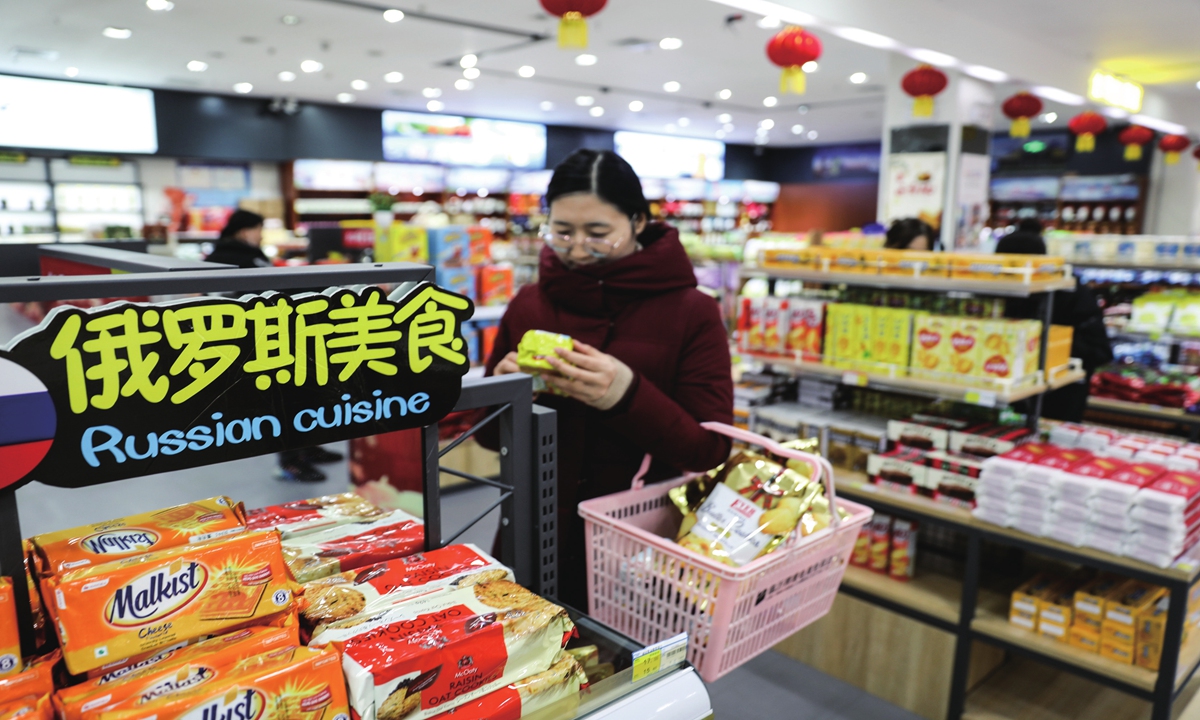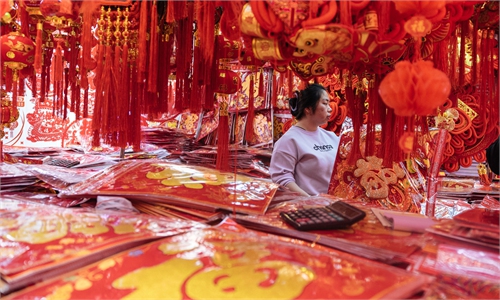New Dynamics in New Year: Global delicacies spice up Spring Festival, bolstered by China’s economic revival and high standard opening-up
Consumption boom is bolstered by economic revival, high-quality opening-up

A customer selects an imported snack on January 23, 2024.from Russia at a duty free shop in Linyi, East China's Shandong Province. Photo: VCG
As the Spring Festival long holidays rapidly approach, bustling scenes are seen in markets across the country as Chinese consumers stock up on holiday presents, food and goodies.
It is a trend that a wide array of global delicacies will be placed on the dining tables, to be integrated with traditional Chinese cuisines thanks to the steady economic revival and high standard opening-up.
A Beijing resident surnamed Wang, who recently attended a shopping exhibition held at the National Agricultural Exhibition Center in Beijing, told the Global Times on Tuesday that she witnessed consumers trying out and picking up goods from various international booths, including Russian natural food, Mexican coffee, and handcrafted products from Pakistan and Ethiopia.
Multiple consumers who spoke to the Global Times said that they have already purchased or planned to shop for some global goodies catering to their family needs, in a bid to spice up the festivity for gatherings during the coming holidays.
They noted that they can easily get their hands on different products worldwide through the diversified choices on Chinese e-commerce platforms which offer very fast delivery.
Observers said that the popularity of imported holiday products in the Chinese market place and the resilience of the country's foreign trade reflect the vitality and potential of China's economy, while the world's second largest economy is poised to play an important role to rev up the global economy thanks to the country's deepening opening-up drive.
Cherries, durian, longan
Another white-collar surnamed Li from Southwest China's Chongqing Municipality recently purchased cherries from Australia. She told the Global Times that the quality of the cherries is worth the price while the delivery was efficient.
Li said that the imported cherries are normally packed in boxes, and the large quantity is more suitable for sharing when friends will be visiting during the holidays.
Imported cherries are just one example of imported fruits and goodies that are popular among Chinese consumers.
The market demand for overseas fruits from China during the Spring Festival holidays is high, especially for tropical products such as Thai longan and durian and Chilean cherries, Deng Haoji, chief operating officer of Chongqing Hongjiu Fruit, told the Global Times on Tuesday, who expects market demand to remain strong.
The sale of imported food products on domestic e-commerce platform Tmall increased by 30 percent year-on-year, with the sales for traditional holiday necessities including snacks, nuts, sweets, and chocolates all surging by nearly 50 percent during the recent shopping festival dedicated for the Spring Festival shopping season.
The sales of imported liquor recorded a triple-digit growth compared with last year on the platform, according to data sent to the Global Times by Tmall.
In addition, international products such as boned leg of lamb from New Zealand, Boston lobster from Canada, and king crabs from Chile along with other products have also been brought to the Chinese market, Walmart-owned Sam's Club told the Global Times in a statement.
Industry insiders highlighted the huge potential of the mega market of 1.4 billion people, while stressing the hot sales is an important manifestation of the Chinese market's opening-up and integration with the world.
Deng said that the compound annual growth rates of popular products like durian, longan and cherries can reach from 15 percent to 25 percent.
The growing popularity of imported products showcased the consumption upgrading for Chinese consumers thanks to their improved income, while the rapid rise of e-commerce also provided more convenient purchase channels, Wang Peng, an associate researcher with the Beijing Academy of Social Sciences, told the Global Times on Wednesday.
Thriving e-commerce
Amid the consumer frenzy, both domestic and international companies have moved to ramp up food supply.
Deng said that the company has established partnership with cherry suppliers from Chile, while empowering the whole supply and industrial chains with advanced digital technology, whereas the cherries and similar purchases would have previously been facilitated through Hong Kong.
A Taobao.com representative from a seafood importer said that they just imported a shipment of New Zealand prawns on January 25 using direct air freight to Shanghai. As of press time, more than 5,000 transactions have been made for the prawn, based on data seen on the brand's product page.
Wang said that China has been committed to promoting trade liberalization by implementing a wide range of targeted measures such as reducing tariffs and optimizing import procedure, which have created favorable conditions for the consumption boom.
For instance, Deng said that the company is able to bring imported products of lower prices and better quality through the New International Land-Sea Trade Corridor, thanks to the China-proposed Belt and Road Initiative.
In 2023, China's General Administration of Customs approved 146 shipments of various types of imported agricultural and food products from 51 countries and regions, which helped meet the diversified needs of Chinese consumers, as well as their aspirations for better lives, the administration said earlier this year.
GAC also signed a total of 156 cooperation documents with foreign partners, including 84 documents on market access for agricultural and food products with the Belt and Road cooperation partners.
Besides ramping up efforts to facilitate imports, China has also actively participated in promoting exports.
The Horgos Port in Northwest China's Xinjiang Uygur Autonomous Region ushered in the first export peak for fruits and vegetables in January as the holiday season approaches, with the total exports totaling 10,000 tons, up four times year-on-year, China Media Group reported on Monday.
As more than 1,000 tons of fresh supplies from across the country are loaded and departed from the export base in Horgos to neighboring countries such as Kazakhstan and Uzbekistan, the report said.
Wang said he is optimistic about China's foreign trade in 2024, boosted by multiple favorable factors, including the resilience of China's supply chain, which will provide significant support for stabilizing the global industrial and supply chains.



